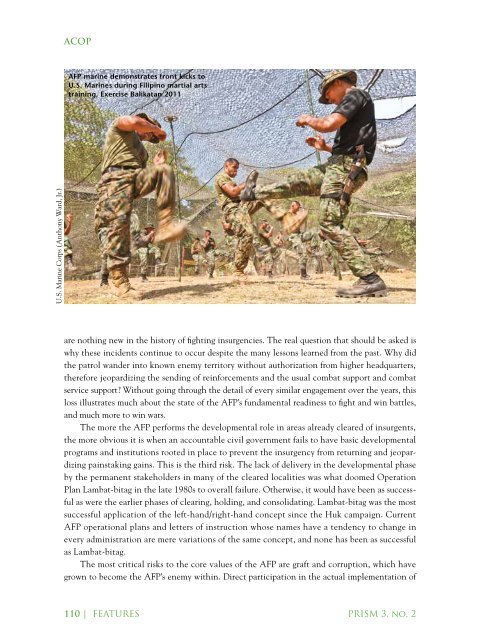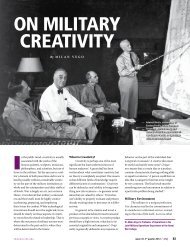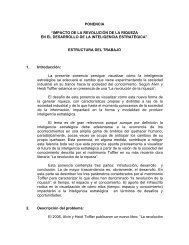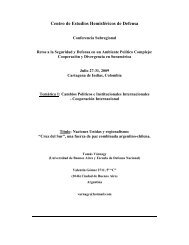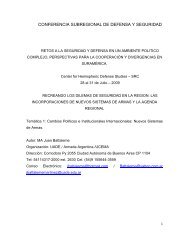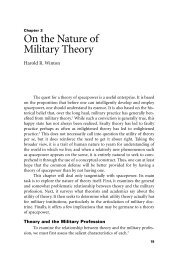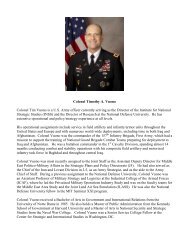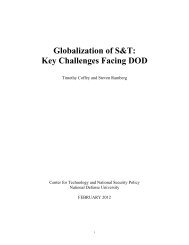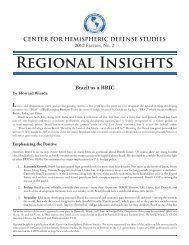The Expanded Nontraditional Role of the AFP - National Defense ...
The Expanded Nontraditional Role of the AFP - National Defense ...
The Expanded Nontraditional Role of the AFP - National Defense ...
You also want an ePaper? Increase the reach of your titles
YUMPU automatically turns print PDFs into web optimized ePapers that Google loves.
U.S. Marine Corps (Anthony Ward, Jr.)<br />
acoP<br />
aFP marine demonstrates front kicks to<br />
u.S. Marines during Filipino martial arts<br />
training, exercise Balikatan 2011<br />
are nothing new in <strong>the</strong> history <strong>of</strong> fighting insurgencies. <strong>The</strong> real question that should be asked is<br />
why <strong>the</strong>se incidents continue to occur despite <strong>the</strong> many lessons learned from <strong>the</strong> past. Why did<br />
<strong>the</strong> patrol wander into known enemy territory without authorization from higher headquarters,<br />
<strong>the</strong>refore jeopardizing <strong>the</strong> sending <strong>of</strong> reinforcements and <strong>the</strong> usual combat support and combat<br />
service support? Without going through <strong>the</strong> detail <strong>of</strong> every similar engagement over <strong>the</strong> years, this<br />
loss illustrates much about <strong>the</strong> state <strong>of</strong> <strong>the</strong> <strong>AFP</strong>’s fundamental readiness to fight and win battles,<br />
and much more to win wars.<br />
<strong>The</strong> more <strong>the</strong> <strong>AFP</strong> performs <strong>the</strong> developmental role in areas already cleared <strong>of</strong> insurgents,<br />
<strong>the</strong> more obvious it is when an accountable civil government fails to have basic developmental<br />
programs and institutions rooted in place to prevent <strong>the</strong> insurgency from returning and jeopardizing<br />
painstaking gains. This is <strong>the</strong> third risk. <strong>The</strong> lack <strong>of</strong> delivery in <strong>the</strong> developmental phase<br />
by <strong>the</strong> permanent stakeholders in many <strong>of</strong> <strong>the</strong> cleared localities was what doomed Operation<br />
Plan Lambat-bitag in <strong>the</strong> late 1980s to overall failure. O<strong>the</strong>rwise, it would have been as successful<br />
as were <strong>the</strong> earlier phases <strong>of</strong> clearing, holding, and consolidating. Lambat-bitag was <strong>the</strong> most<br />
successful application <strong>of</strong> <strong>the</strong> left-hand/right-hand concept since <strong>the</strong> Huk campaign. Current<br />
<strong>AFP</strong> operational plans and letters <strong>of</strong> instruction whose names have a tendency to change in<br />
every administration are mere variations <strong>of</strong> <strong>the</strong> same concept, and none has been as successful<br />
as Lambat-bitag.<br />
<strong>The</strong> most critical risks to <strong>the</strong> core values <strong>of</strong> <strong>the</strong> <strong>AFP</strong> are graft and corruption, which have<br />
grown to become <strong>the</strong> <strong>AFP</strong>’s enemy within. Direct participation in <strong>the</strong> actual implementation <strong>of</strong><br />
110 | FeatuReS PRISM 3, no. 2


